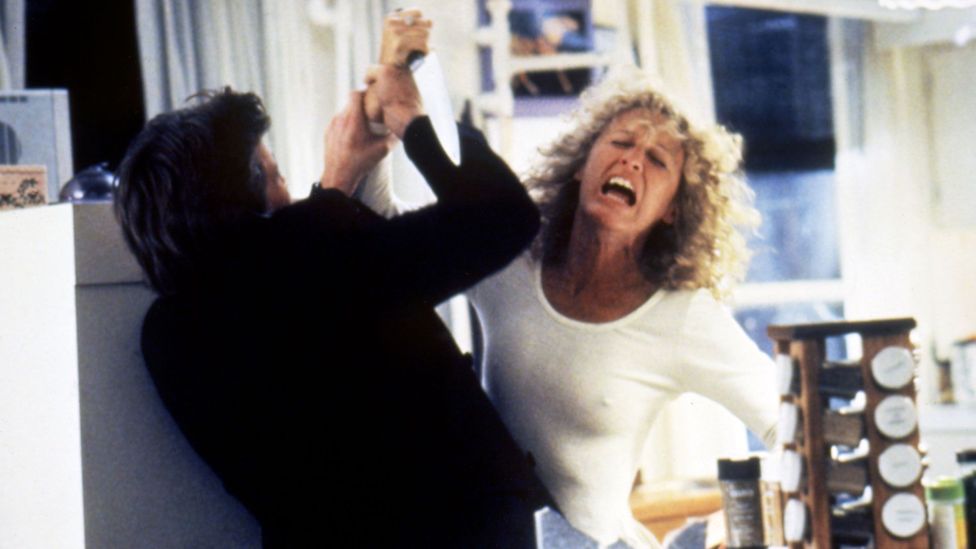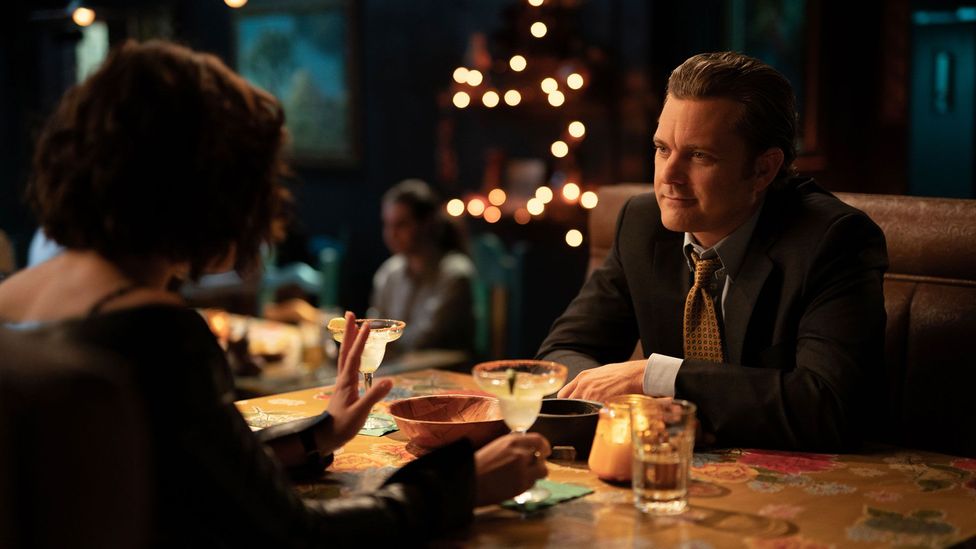In a world where Super Mario films and sexless Marvel sequels reign supreme at the box office, it's hard to imagine a return to 1987, where the highest-grossing film in the world was a psychosexual thriller about an extra-marital affair. Adrian Lyne, the king of the erotic thriller, directed Fatal Attraction, which grossed $320 million globally and was nominated for six Oscars. Now Paramount Plus is hoping to replicate some of that success with a new small-screen adaptation starring Joshua Jackson, Lizzy Caplan and Amanda Peet as the central trio.
More like this:
– The best TV to watch in April
– How Basic Instinct killed the erotic thriller
– Why Hollywood is shunning sex
In the original, Michael Douglas played Dan Gallagher, a married lawyer with an adorable daughter and perfect wife, Beth (Anne Archer). He meets Alex Forrest (Glenn Close), a successful book editor and they embark on a brief affair, but when Dan tries to end things, Alex does not take no for an answer and, among other things, famously boils the family's pet rabbit in retaliation. The film ends with Beth shooting Alex dead, after she turns up at their family home with murderous intent, but this was not the original plan. The first cut of the film saw Alex kill herself and frame Dan for her murder, but test audiences wanted to see her most resolutely punished, resulting in an ending that film critic Karina Longworth described in the Erotic '80s series of her podcast You Must Remember This as "bigger but stupider". "Audiences needed some kind of big blowout at the end," Longworth tells BBC Culture, expanding on her point. "They couldn't accept a more low-key ending with more empathy for the Glenn Close character.” But as Longworth also explains, some people maintained empathy for her despite the brutal conclusion. "Fatal Attraction almost played like a completely different movie to different people depending on what their point of view was at the time."

The original Fatal Attraction film tapped into cultural anxieties about sex and feminism (Credit: Alamy)
Indeed, the film's ability to inspire many readings was part of its success, says Longworth: "that film that was in the American media for nine months after its release. There was so much debate to be had. Some people saw it as being feminist, others saw it as very anti-feminist." At a time of Reagan, the Aids crisis and a backlash against second-wave feminism, Fatal Attraction picked up on cultural anxieties that sex was dangerous and professional women were a threat to the American family. But as Michael Conroy, founder of Men At Work, a company set up to deliver training to young men that challenges sexism, says, the film also tapped into something "thousands of years old about women being property and about a man having to be the commander of his house and relationships and having the last word". When Dan tells Alex it's over, that is framed as being the definitive end, and when Alex says she won't allow him "to treat me like some slut you can just bang a couple of times and throw in the garbage”, that is ultimately presented as an unreasonable request. "Whether it's Shakespeare or Ancient Greek [drama], throughout history we come back to the same questions of what are the permissions and freedoms for men v women," says Conroy.
The birth of a toxic phrase
One of the most enduring elements of Fatal Attraction's complex legacy has come from the murder of that family pet – with the entry of the term "bunny boiler" into the popular lexicon turning Alex into a punchline. Within dating culture, it has come to describe a woman who is emotionally unstable, obsessive and potentially vengeful towards male romantic partners, bolstering a harmful stereotype and used by those who have never even seen the film. "This victim-blaming idea of 'what's a poor guy to do? she's crazy' is all part of this paradox of belief that women are emotionally and mentally feeble and can't be trusted with positions of responsibility, and men are more stable and static and rational and logical, and at the same time should never be held to account for what we do," says Conroy.
Michael Douglas's Dan ultimately ends up with his life and family (save one fluffy pet) intact. And as the erotic thriller progressed through the 1990s, Douglas would star in other problematic examples of the genre, which positioned powerful, independent women as a threat, including Basic Instinct (1992), in which he played a detective lusting after an enigmatic crime novelist and serial killer played by Sharon Stone, and Disclosure (1994) with Demi Moore. Longworth describes the latter as “a female boss sexually harassing her male underling as part of a scheme to cover up her own professional incompetence. So you get to have it both ways in terms of the panic. To express the fear of the strong woman in the workplace and satisfy people who think that women in a position of power over men must be incompetent and probably did something dastardly to get there.”
But outside of Douglas's oeuvre, the figure of the "bunny boiler" became even more absurd as the culture, and its cinema, did some ludicrous mental gymnastics to cast men as women’s victims. The '90s saw the media cast Monica Lewinsky and Anita Hill as the manipulative obsessive seductresses of a president, Bill Clinton, and supreme court judge, Clarence Thomas, respectively. And Longworth's current series of You Must Remember This, Erotic '90s, will discuss films like Poison Ivy (1992) and The Crush (1993) where grown men face "bunny boilers" that are 16 and 14, respectively. "I have several episodes that I'm doing about what I call the '90s Lolita' which was a really prevalent trend," she says, with a sigh. For Longworth, while the way Fatal Attraction treated Alex left much to be desired, she was at least a 36-year-old adult – whereas, she says, the films of the 90s that followed suggested that "if you are a sexy teenage girl, if you have the power to turn on an adult man, you should be treated like an adult woman."
While this particularly noxious variety of Fatal Attraction spin-off may have been a short fad, the wider concept of the "bunny boiler" endured and has had a pernicious effect on further generations of women. "I do work in the domestic abuse sphere as well and the 'mad ex' is very powerful tool for grooming a new victim," Conroy explains. "Saying, 'oh, you know, I've got this really difficult ex-partner. She's crazy. She just lies all the time.' You see it all the time with multiple abusers."
A disappointing remake
For those coming to the post-#Metoo Paramount adaptation, thinking that the fact it was developed by and directed by women would mean a new approach to the "crazy ex", and that this time Alex would not be such a "bunny boiler"… well, there is bad news. If anything, from the episodes I have seen, Caplan's Alex is less sympathetic, and more maniacal than her predecessor – while Jackson's Dan is sweeter, more endearing and ultimately painted as even more of a victim of women's wily schemes than Douglas's incarnation. As for that bunny? Showrunner Alex Cunningham has confirmed that while a rabbit does appear, there will be no rabbit murder at any point in the new series, though it does give a nod to that infamous scene.

The new Fatal Attraction TV series doesn't change the regressive gender dynamic of the originals (Credit: Paramount+)
For Conroy, however, this return to a world of crazed women and male victims is worryingly symptomatic of a re-emergence of chauvinism, in a world where someone like self-proclaimed misogynist Andrew Tate wields incredible online influence. "He's just saying the same stuff that Fatal Attraction is, about wanting to be a very infantile man able to do what he wants with no negative consequences," says Conroy. "Dan is like a child who doesn't really know what he's playing with while Alex is a knowing adult in contrast."
That the latest adaptation buys into that gender dynamic is ultimately disappointing, particularly as TV has been the medium in which erotic thrillers, female-led stories, and new visions of female desire have been given room to flourish. In Kristy Guevara Flanagan's recent documentary Body Parts, looking at the evolution of sex on screen, she talked to many TV showrunners already making waves in viewing sex and female desire without a misogynistic lens. "As TV writers and showrunners and directors, [women] have always been more successful. Historically film is more conservative, and making women's stories is considered more risky," she says. She highlights the work of creators like Joey Soloway (Transparent, I Want Dick) and Tanya Saracho (Vida), whose series are filled "with people who are desirous and not just sexually, but [in a way] that leaks out of them in such interesting and flawed ways we can relate to, and ways that relate to the character development and their story arcs. They just really have done an interesting job of kind of reinventing that gaze."
While the latest Fatal Attraction doesn't meaningfully shift the gaze, or risk challenging the "bunny boiler" stereotype, it also buys into a strangely old-fashioned puritanism, which sees sex as ultimately dangerous. Outside the world of sex-positive progress, it seems that many fears around sex and women still abound. Guevara Flanagan thinks that "the culture is very fearful of women's bodies, of women's reproductiveness, and it's still seen as a mystery, and as scary and frightening when it's not contained."
Guevara Flanagan is broadly heartened by the current "small revival of the erotic thriller" on screen – but says what is regressive in examples like Fatal Attraction is that they feature women that "are powerful to a certain point, and that power is sexual, then ultimately they're either killed or restored to some rightful familial or maternal position and 'cured'." It may be down to the next generation of creatives to really crush the patriarchal norms that have made the "bunny boiler" such a pervading archetype – and Guevara Flanagan has a front seat to their ascent. "I'm also a film professor and [I see] emerging filmmakers who are seeing things differently and reinventing the language, finding new ways to tell these stories." But even though there are so many more new stories out there to tell, one can only hope that one day, there will also be another Fatal Attraction in which Alex Forrest finally gets justice.
Fatal Attraction premieres on April 30 on Paramount+ in the US and May 1 on Paramount+ in the UK
Love film and TV? Join BBC Culture Film and TV Club on Facebook, a community for cinephiles all over the world.
If you would like to comment on this story or anything else you have seen on BBC Culture, head over to our Facebook page or message us on Twitter.
And if you liked this story, sign up for the weekly bbc.com features newsletter, called The Essential List. A handpicked selection of stories from BBC Future, Culture, Worklife and Travel, delivered to your inbox every Friday.
Fatal Attraction and the endurance of the 'bunny boiler', dating culture's most toxic stereotype - BBC
Read More

No comments:
Post a Comment